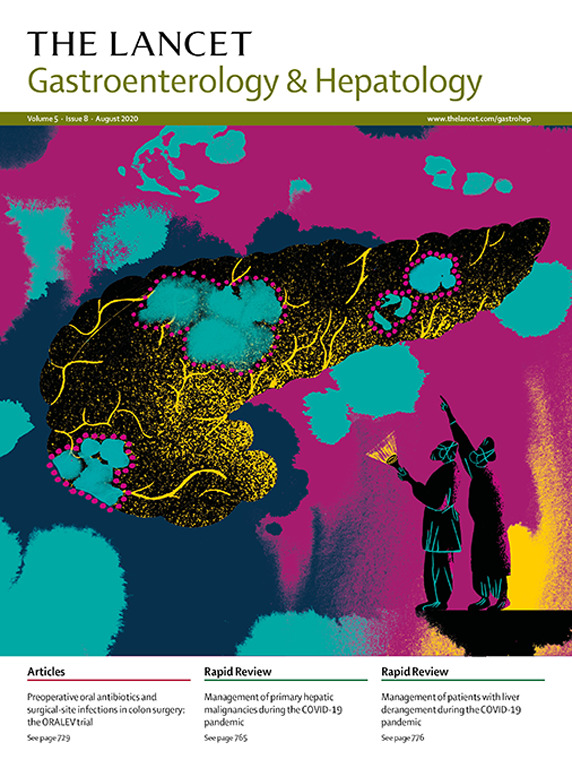Isolated perianal Crohn's disease: a systematic review and expert consensus proposing novel diagnostic criteria and management advice
IF 30.9
1区 医学
Q1 GASTROENTEROLOGY & HEPATOLOGY
引用次数: 0
Abstract
Perianal fistulae can present a diagnostic challenge when distinguishing perianal Crohn's disease from idiopathic perianal fistulae. This distinction is key, as perianal Crohn's disease requires inflammatory bowel disease (IBD) therapy, whereas idiopathic perianal fistulae are primarily managed surgically. When luminal inflammation is absent, but Crohn's disease is suspected, the term isolated perianal Crohn's disease is sometimes applied. However, no formal guidance exists for diagnosing or managing isolated perianal Crohn's disease. Furthermore, whereas fistula granuloma might provide specific evidence of Crohn's disease, they are rarely detected in perianal fistulae, so are unlikely to sensitively delineate aetiology. This project aimed to develop an opinion-based framework for isolated perianal Crohn's disease. A systematic review evaluated clinical features suggestive of isolated perianal Crohn's disease and evidence for IBD therapies in patients with perianal fistulae without luminal IBD. The findings of this systematic review informed a multidisciplinary consensus process with IBD specialists, resulting in the formulation of diagnostic criteria and management recommendations for isolated perianal Crohn's disease. We then tested this diagnostic approach in a prospective cohort of 50 patients treated as having idiopathic perianal fistulae at a proctology referral centre, identifying six (12%) individuals as meeting the diagnostic criteria. Our findings underscore the scarcity of evidence guiding isolated perianal Crohn's disease diagnosis and the need for a composite risk-based assessment. The proposed framework provides a tool for clinical practice and research but requires validation and refinement. Clear communication with patients is essential, given the diagnostic and therapeutic uncertainties. Future studies should refine these criteria, explore biological markers for isolated perianal Crohn's disease, and establish evidence-based methods to differentiate isolated perianal Crohn's disease within the perianal fistulae spectrum.孤立性肛周克罗恩病:系统回顾和专家共识提出新的诊断标准和管理建议
当鉴别肛周克罗恩病和特发性肛周瘘管时,肛周瘘管是一个诊断挑战。这种区别是关键,因为肛周克罗恩病需要炎症性肠病(IBD)治疗,而特发性肛周瘘管主要通过手术治疗。当腔内没有炎症,但怀疑是克罗恩病时,有时也称为孤立性肛周克罗恩病。然而,目前还没有关于孤立性肛周克罗恩病的诊断和治疗的正式指南。此外,尽管瘘管肉芽肿可能提供克罗恩病的具体证据,但它们很少在肛周瘘管中被检测到,因此不太可能敏感地描述病因。本项目旨在为孤立性肛周克罗恩病建立基于意见的治疗框架。一项系统综述评估了提示孤立性肛周克罗恩病的临床特征和无腔内IBD的肛周瘘患者的IBD治疗证据。本系统综述的发现为IBD专家的多学科共识过程提供了信息,最终形成了孤立性肛周克罗恩病的诊断标准和治疗建议。然后,我们在50名在直肠科转诊中心治疗的特发性肛周瘘患者的前瞻性队列中测试了这种诊断方法,确定了6名(12%)符合诊断标准的个体。我们的研究结果强调了指导孤立性肛周克罗恩病诊断的证据的稀缺性和综合风险评估的必要性。提出的框架为临床实践和研究提供了工具,但需要验证和改进。鉴于诊断和治疗的不确定性,与患者进行清晰的沟通是必不可少的。未来的研究应完善这些标准,探索孤立性肛周克罗恩病的生物学标志物,并建立以证据为基础的方法来区分孤立性肛周克罗恩病在肛周瘘谱。
本文章由计算机程序翻译,如有差异,请以英文原文为准。
求助全文
约1分钟内获得全文
求助全文
来源期刊

Lancet Gastroenterology & Hepatology
Medicine-Hepatology
CiteScore
50.30
自引率
1.10%
发文量
0
期刊介绍:
The Lancet Gastroenterology & Hepatology is an authoritative forum for key opinion leaders across medicine, government, and health systems to influence clinical practice, explore global policy, and inform constructive, positive change worldwide.
The Lancet Gastroenterology & Hepatology publishes papers that reflect the rich variety of ongoing clinical research in these fields, especially in the areas of inflammatory bowel diseases, NAFLD and NASH, functional gastrointestinal disorders, digestive cancers, and viral hepatitis.
 求助内容:
求助内容: 应助结果提醒方式:
应助结果提醒方式:


